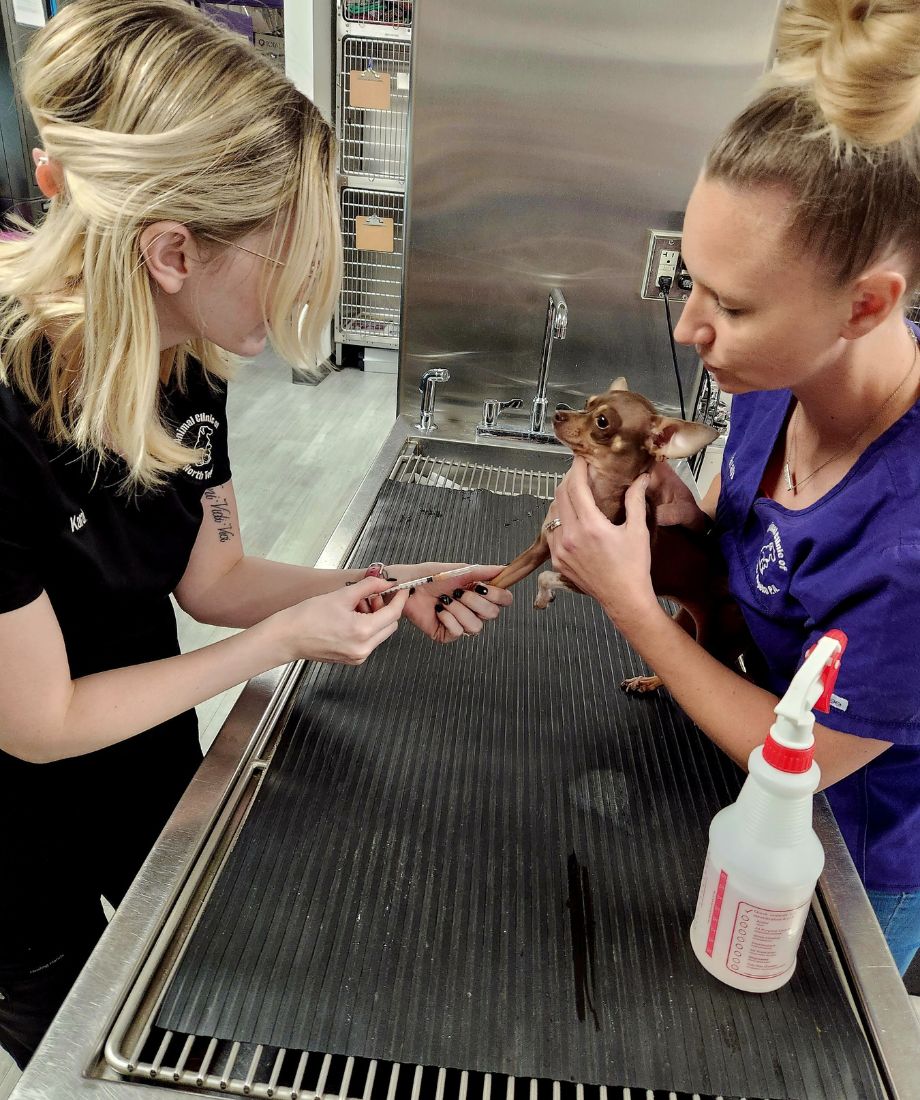Preventative Care
Preventive care for our pets is just as vital as regular pet care. At the Animal Clinic of North Topeka, we offer comprehensive preventive services to ensure your pet’s overall well-being.
Heartworm Disease
How is Heartworms Spread? A mosquito picks up baby heartworms from an infected dog. The microfilariae mature inside the mosquito, then young larvae are spread when the mosquito feeds on a new dog. Those larvae grow in the dog’s tissues for 6 months, ending up in the heart and pulmonary vessels as adults. There, the female adults create new microfilariae that circulate in the bloodstream until picked up by a mosquito and the cycle continues.

Preventing Heartworm Disease
Dogs should begin heartworm prevention at 6-8 weeks old. Heartworms can be transmitted year-round, so never skip a month! Puppies under the age of 6 months do not need a heartworm test prior to starting prevention, but they will be tested for heartworms at each annual exam to ensure they stay heartworm-free.
While we cannot prevent mosquito bites, the next best thing is to kill the young larvae they transmit. Monthly heartworm preventive chews will “deworm” your dog from any larvae transmitted in the previous 30 days. Dogs must receive a preventive every 30 days or an injection once a year because once the larvae begin to grow, they become resistant to the preventive. At that point, the parasite can only be killed by a series of injections that can be both very tough on your pet’s health and very expensive.
Most heartworm preventatives also prevent some intestinal parasites as well. Below is a list of different heartworm preventatives and intestinal parasites they protect against.
| Product | Type | Frequency | Roundworm | Hookworm | Whipworm | Tapeworm |
| Credilo Quattro | Chewable | Monthly | + | + | – | + |
| Interceptor Plus |
Chewable | Monthly | + | + | + | + |
| ProHeart 6 | Injection | Every 6 months | – | + | – | – |
| ProHeart 12 | Injection | Yearly | – | + | – | – |
Flea and Tick Control
Fleas and ticks are easy to pick up and very difficult to eliminate from your home, so we recommend your pet begin flea and tick control as early as 8 weeks of age. To keep fleas and ticks out of your home, make sure all animals (including indoor cats!) are on monthly control. While fleas spread tapeworms, ticks carry a variety of diseases including Lyme disease, anaplasmosis, and ehrlichiosis. Flea and tick products will cause biting ticks to die before they are attached long enough to spread disease or eat a full-blood meal. Below is a list of flea and tick products that our veterinary team recommends for your pet and how they are administered.
| Product | Type | Frequency |
| Credilo Quattro | Chewable | Monthly |
| Simparica | Chewable | Monthly |
| Credelio | Chewable | Monthly |
| Revolution Plus | Topical | Monthly |
Intestinal Parasites
We recommend annually collecting a fecal sample to test for any intestinal parasites in your pets. There are numerous intestinal parasites but no universal dewormer, so it is the most economical and safest for your pet to test first, then only treat them with what they need. Most intestinal parasites are spread by fecal contamination, so in addition to deworming medication, also be sure to pick up feces out of the yard immediately to prevent re-infection! Roundworms and hookworms are zoonotic, meaning they can be spread from dogs to humans, so always wash your hands! Below is a list of the most common intestinal parasites and how they spread.
| Product | Description |
| Roundworms **ZOONOTIC** |
|
| Hookworms **ZOONOTIC** |
|
| Tapeworms |
|
| Whipworms |
|
| Giardia |
|
| Coccidia |
|
